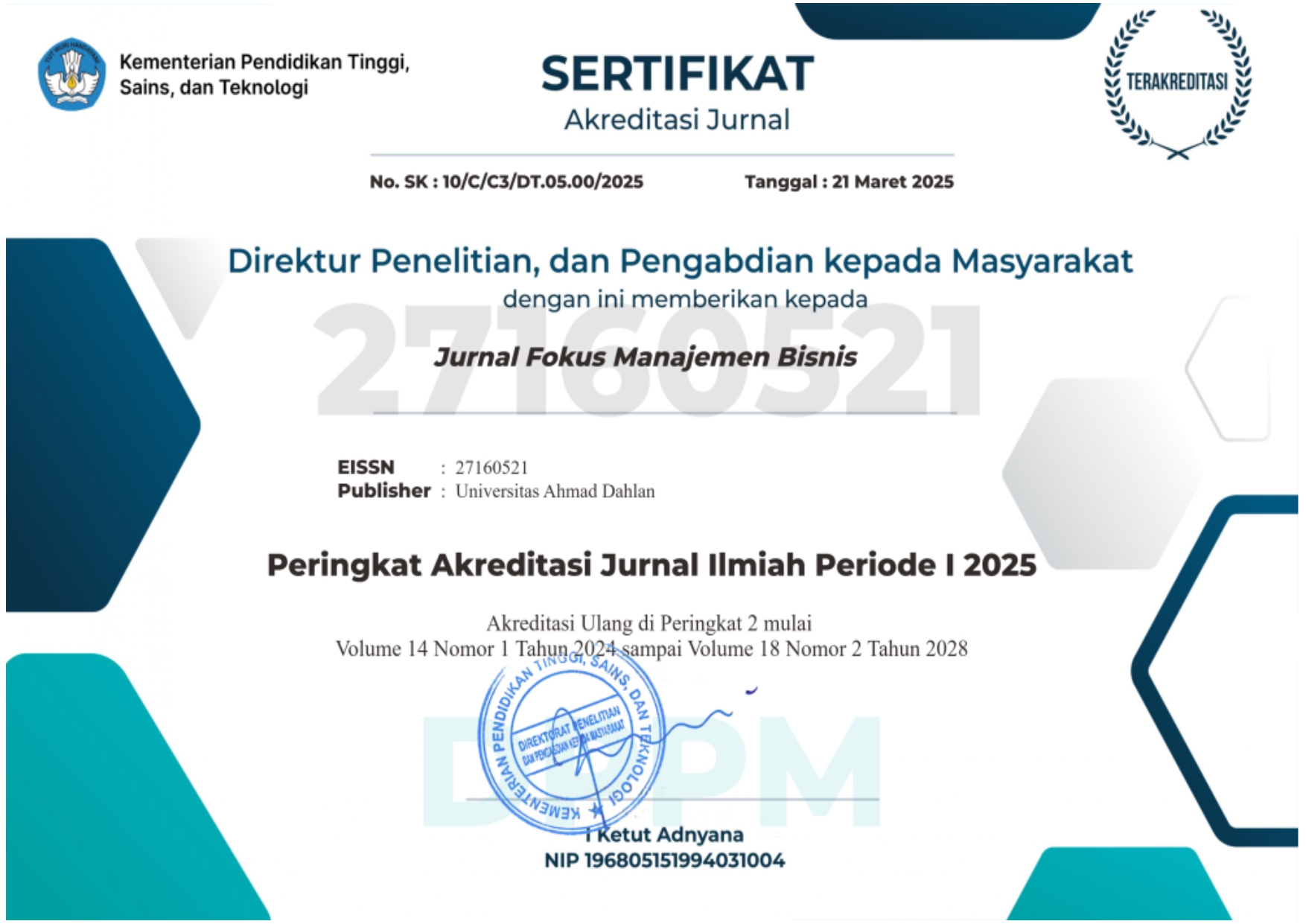The role of green product as an intermediary of environmental attitude and environmental knowledge on green behavior
DOI:
https://doi.org/10.12928/fokus.v14i1.9490Abstract
The impact of global warming has made people aware of the importance of environmental preservation. Therefore, it is necessary to implement green product behavior in university environments. However, there is a need for more awareness among students about the use of green products. This research seeks to fill this research gap by developing appropriate green marketing strategies that help implement environmentally friendly behavior in students. This study aimed to determine the mediating role of green products on the influence of environmental knowledge and attitude on the green behavior of students. The sample consisted of 30 respondents, selected using a non-probability sampling technique. The collected data were subsequently processed using Smart PLS. The results show a mediating role of green products on the influence of environmental knowledge and attitude on student green behavior.
References
Abbasi, C., Enayati, G., & Rahbari, M. (2013). Factors influencing the green purchasing behavior of Iranian Students (Case study: Students of Islamic Azad University of Qazvin). Journal of Management, 9(3), 36-49.
Ajzen, I. (1991). The theory of planned behaviour: Reactions and reflections. Psychology and Health, 26(9), 1113–1127. https://doi.org/10.1080/08870446.2011.613995
Ali, A., & Ahmad, I. (2016). Environment friendly products: Factors that influence the green purchase intentions of Pakistani consumers. Pakistan Journal of Engineering, Technology & Science, 2(1).
Altinigne, N., & Bilgin, Z. (2015). The effect of environmental attitudes on environmentally conscious behavior of university students. 145th International Marketing Trends Conference, Paris.
Ansu-Mensah, P. (2021). Green product awareness effect on green purchase intentions of university students: An emerging market’s perspective. Future Business Journal, 7(1), 1–13. https://doi.org/10.1186/s43093-021-00094-5
Bertrandias, L., & Elgaaied-Gambier, L. (2014). Others’ environmental concern as a social determinant of green buying. Journal of Consumer Marketing, 31(6/7), 417-429. https://doi.org/10.1108/JCM-05-2014-0966
Bhalerao, V. R., & Deshmukh, D. A. (2015). Green marketing: Greening the 4 P of Marketing. International Journal of Knowledge and Research in Management & E-Commerce, 5(2).
Capra, F. (2007). Sustainable living, ecological literacy, and the breath of life. Canadian Journal of Environmental Education, 12.
Chan, E. H. W., & Lee, G. K. L. (2009). Design considerations for environmental sustainability in high density development: A case study of Hong Kong. Environment, Development and Sustainability, 11(2). https://doi.org/10.1007/s10668-007-9117-0
Chan, E. S. W., Hon, A. H. Y., Chan, W., & Okumus, F. (2014). What drives employees’ intentions to implement green practices in hotels? The role of knowledge, awareness, concern and ecological behaviour. International Journal of Hospitality Management, 40. https://doi.org/10.1016/j.ijhm.2014.03.001
Chen, Y. S., Chang, C. H., Yeh, S. L., & Cheng, H. I. (2015). Green shared vision and green creativity: The mediation roles of green mindfulness and green self-efficacy. Quality and Quantity, 49(3). https://doi.org/10.1007/s11135-014-0041-8
Chopra, S., & Meindl, P. (2007). Supply chain management: Strategy, planning & operation. Das Summa Summarum des Management. https://doi.org/10.1007/978-3-8349-9320-5_22
Dagher, G. K., Itani, O., & Kassar, A. N. (2015). The impact of environment concern and attitude on green purchasing behavior: Gender as the moderator. Contemporary Management Research, 11(2). https://doi.org/10.7903/cmr.13625
Dangelico, R. M., & Vocalelli, D. (2017). Green marketing: An analysis of definitions, strategy steps, and tools through a systematic review of the literature. Journal of Cleaner Production, 165. https://doi.org/10.1016/j.jclepro.2017.07.184
Do Paco, A., & Raposo, M. (2009). “Green” segmentation: An application to the Portuguese consumer market. Marketing Intelligence & Planning, 27(3), 364-379. https://doi.org/10.1108/02634500910955245
Elahi, S., & Yaghubi, R. (2012). The introduction of green marketing tools and their impact on consumer purchasing behavior. Improvement and Transformation Management Studies, 21(5), 167-168.
Erwinsyah, E. (2022). Environmental knowledge, attitudes, and practices for behavior change of university students: The case of Indonesia. Journal of Steam Education, 5(2), 181–192. https://doi.org/10.55290/steam.1075516
Fawehinmi, O., Yusliza, M. Y., Kasim, W. Z. W., Mohamad, Z., & Halim, M. A. S. A. (2020). Exploring the interplay of green human resource management, employee green behavior, and personal moral norms. SAGE Open, 10(4). https://doi.org/10.1177/2158244020982292
Fuady, I., Prasanti, D., & Indriani, S. S. (2020). Penerapan teori plan behavior: Faktor yang mempengaruhi niat perilaku hidup bersih dan sehat. Jurnal Berkala Kesehatan, 6(1). https://doi.org/10.20527/jbk.v6i1.8638
Ghozali, I., & Latan, H. (2015). Partial least squares konsep, teknik dan aplikasi menggunakan program Smart PLS 3.0 untuk penelitian empiris. Badan Penerbit Universitas Diponegoro.
Goleman, D., Bennett, L., & Barlow, Z. (2012). Eco literate: How educators are cultivating emotional, social and ecological intellegence. John Wiley & Sons.
Grindsted, T. S. (2015). Sustainable universities from declarations on sustainability in higher education to national law. SSRN Electronic Journal. https://doi.org/10.2139/ssrn.2697465
Haryono, A. T. (2021). Pengaruh environmental knowledge dan environmental attitude terhadap pro-environmental purchahasing behaviour (Sebuah study tentang perilaku konsumen gen Z). AKSES: Jurnal Ekonomi Dan Bisnis, 16(2). https://doi.org/10.31942/akses.v16i2.5552
Jamal, F. N., Othman, N. A., Fitriani, D., Rohmah, W., Leuveano, R. A. C., & Fahmi, A. A. (2023). Integrated model of brand trust for green marketing. International Journal of Sustainable Development and Planning, 18(6). https://doi.org/10.18280/ijsdp.180617
Jamal, F. N., Othman, N. A., Nizam, N. Z., Jelita, A., Rohmah, W., & Dzakiyullah, N. R. (2022). Green marketing: Reviewing aspect of communication tools. International Journal of Sustainable Development and Planning, 17(4). https://doi.org/10.18280/ijsdp.170405
Juwaheer, T. D., Pudaruth, S., & Noyaux, M. M. E. (2012). Analysing the impact of green marketing strategies on consumer purchasing patterns in Mauritius. World Journal of Entrepreneurship, Management and Sustainable Development, 8(1), 36-59. https://doi.org/10.1108/20425961211221615
Katz, I. M., Rauvola, R. S., Rudolph, C. W., & Zacher, H. (2022). Employee green behavior: A meta-analysis. Corporate Social Responsibility and Environmental Management, 29(5). https://doi.org/10.1002/csr.2260
Keraf, A. S. (2014). Filsafat lingkungan hidup: Alam sebagai sebuah sistem kehidupan bersama Fritjof Capra. Kanisius Publisher.
Kim, H. Y., & Chung, J. E. (2011). Consumer purchase intention for organic personal care products. Journal of Consumer Marketing, 28(1), 40-47. https://doi.org/10.1108/07363761111101930
Kim, Y. (2011). Understanding green purchase: The influence of collectivism, personal values and environmental attitudes, and the moderating effect of perceived consumer effectiveness. Seoul Journal of Business, 17(1), 65.
Kotler, P., & Armstrong, G. (2017). Principles of marketing: Seventeenth edition. Pearson.
Lee, K. (2008). Opportunities for green marketing: Young consumers. Marketing Intelligence & Planning, 26(6), 573-586. https://doi.org/10.1108/02634500810902839
Milfont, T. L. (2007). Psychology of environmental attitudes: A cross-cultural study of their content and structure. (Doctoral dissertation, The University of Auckland).
Monsuwé, T. P. Y., Benedict, G. C. D., & Ko, D. R. (2004). What drives consumers to shop online? A literature review. International Journal of Service Industry Management, 15(1). https://doi.org/10.1108/09564230410523358
Newton, J. D., Tsarenko, Y., Ferraro, C., & Sands, S. (2015). Environmental concern and environmental purchase intentions: The mediating role of learning strategy. Journal of Business Research, 68(9), 1974-1981. https://doi.org/10.1016/j.jbusres.2015.01.007
Peattie, K., & Peattie, S. (1995). Sales promotion: A missed opportunity for services marketers? International Journal of Service Industry Management, 6(1), 22–39. https://doi.org/10.1108/09564239510078830
Polonsky, M. J. (1994). An introduction to green marketing. Electronic Green Journal, 1(2). https://doi.org/10.5070/g31210177
Ramayah, T., Lee, J. W. C., & Mohamad, O. (2010). Green product purchase intention: Some insights from a developing country. Resources, Conservation and Recycling, 54(12), 1419-1427. https://doi.org/10.1016/j.resconrec.2010.06.007
Steg, L., & Vlek, C. (2009). Encouraging pro-environmental behaviour: An integrative review and research agenda. Journal of Environmental Psychology, 29(3). https://doi.org/10.1016/j.jenvp.2008.10.004
Sugiarto, A., & Gabriella, D. A. (2020). Kesadaran dan perilaku ramah lingkungan mahasiswa di kampus. Jurnal Ilmu Sosial Dan Humaniora, 9(2). https://doi.org/10.23887/jish-undiksha.v9i2.21061
Sugiyono. (2022). Metode penelitian kuantitatif, kualitatif, dan R&D. Alfabeta.
Utami, K. S. (2020). Green consumers behavior: Perilaku konsumen dalam pembelian produk ramah lingkungan. Jurnal Maksipreneur: Manajemen, Koperasi, Dan Entrepreneurship, 9(2). https://doi.org/10.30588/jmp.v9i2.499
Wandari, N. K. M. A., & Darma, G. S. (2020). Pengelolaan karakter green behavior pada generasi milenial dalam meningkatkan minat penggunaan green product. Jurnal Akuntansi Dan Manajemen, 17(02). https://doi.org/10.36406/jam.v17i02.305
Zsóka, Á., Szerényi, Z. M., Széchy, A., & Kocsis, T. (2013). Greening due to environmental education? Environmental knowledge, attitudes, consumer behavior and everyday pro-environmental activities of Hungarian high school and university students. Journal of Cleaner Production, 48. https://doi.org/10.1016/j.jclepro.2012.11.030
Downloads
Published
How to Cite
Issue
Section
License
Copyright (c) 2024 Fauziyah Nur Jamal, Nabila Na’ma Aisa, Norfaridatul Akmaliyah Othman, Geraldine B. Advincula, Wafrotur Rohmah

This work is licensed under a Creative Commons Attribution-ShareAlike 4.0 International License.
Authors who publish with this journal agree to the following terms:Â
- Authors retain copyright and grant the journal right of first publication with the work simultaneously licensed under a Creative Commons Attribution License that allows others to share the work with an acknowledgment of the work's authorship and initial publication in this journal.
- Authors are able to enter into separate, additional contractual arrangements for the non-exclusive distribution of the journal's published version of the work (e.g., post it to an institutional repository or publish it in a book), with an acknowledgment of its initial publication in this journal.
- Authors are permitted and encouraged to post their work online (e.g., in institutional repositories or on their website) prior to and during the submission process, as it can lead to productive exchanges, as well as earlier and greater citation of published work (See The Effect of Open Access).







